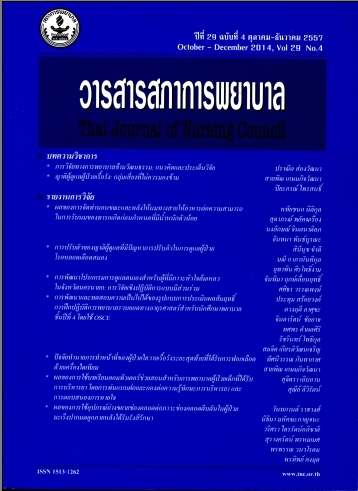ผลของการใช้บทเรียนคอมพิวเตอร์ช่วยสอนสำหรับการพยาบาลผู้ป่วยเด็กที่ได้รับการบริหารยาโดยการพ่นแบบฝอยละอองต่อความรู้ทักษะการบริหารยา และการตอบสนองการหายใจ
Keywords:
การบริหารยาโดยการพ่นแบบฝอยละออง/ บทเรียนคอมพิวเตอร์ช่วยสอน/ ความรู้/ การตอบสนองการหายใจ/ ทักษะ, aerosol administration therapy, computer-assisted instruction, knowledge, respiratory response, skillsAbstract
บทคัดย่อ: วัตถุประสงค์ของการวิจัย: ศึกษาผลของการใช้บทเรียนคอมพิวเตอร์ช่วยสอนเรื่องการพยาบาลผู้ป่วยเด็กที่ได้รับการบริหารยาโดยการพ่นแบบฝอยละอองต่อความรู้และทักษะการบริหารยาของพยาบาล และการตอบสนองการหายใจของผู้ป่วยเด็ก
การออกแบบวิจัย: การวิจัยกึ่งทดลอง แบบกลุ่มเดียววัดซ้ำก่อนและหลังการทดลอง
วิธีดำเนินการวิจัย: กลุ่มตัวอย่างพยาบาลประจำการ งานการพยาบาลกุมารเวชศาสตร์ จำนวน 31 รายศึกษาบทเรียนคอมพิวเตอร์ช่วยสอนเรื่อง การพยาบาลผู้ป่วยเด็กที่ได้รับการบริหารยาโดยการพ่นแบบฝอยละอองด้วยตนเอง ผู้วิจัยวัดความรู้และทักษะการบริหารยาของพยาบาลโดยใช้แบบประเมินที่ผู้วิจัยสร้างเอง และวัดการตอบสนองการหายใจของผู้ป่วยเด็กโดยใช้คะแนนการตอบสนองการหายใจทางคลินิคของศิริราช ก่อนและหลังศึกษาบทเรียนคอมพิวเตอร์ช่วยสอนด้วยตนเอง เปรียบเทียบความแตกต่างของความรู้ ทักษะ และการตอบสนองการหายใจ ด้วยการวิเคราะห์ความแปรปรวนทางเดียวแบบวัดซ้ำและการทดสอบทีแบบสองกลุ่มสัมพันธ์กัน
ผลการวิจัย: พบว่าผู้เข้าร่วมวิจัยมีค่าเฉลี่ยคะแนนความรู้และทักษะหลังเรียนบทเรียนคอมพิวเตอร์ช่วยสอนมากกว่าก่อนได้เรียนอย่างแตกต่างที่ระดับนัยสำคัญ .05 (p = .000 และ p = .000) ตามลำดับ และผู้ป่วยเด็กที่ได้รับการบริหารยาโดยการพ่นฝอยละอองมีการตอบสนองการหายใจดีขึ้นหลังการบริหารยาโดยการพ่นฝอยละออง เปรียบเทียบจากผู้เข้าร่วมวิจัยขณะเริ่มเข้าร่วมวิจัยและหลังการศึกษาบทเรียนคอมพิวเตอร์ช่วยสอน แตกต่างกันที่ระดับนัยสำคัญ .05 (p = .029)
ข้อเสนอแนะ: ผลการศึกษาสนับสนุนประโยชน์ของการใช้บทเรียนคอมพิวเตอร์ช่วยสอนในการเรียนรู้การบริหารยาโดยการพ่นแบบฝอยละออง และการฝึกทักษะของพยาบาลงานการพยาบาลกุมารเวชศาสตร์สำหรับการพยาบาลผู้ป่วยเด็กที่ได้รับการบริหารยาโดยการพ่นฝอยละออง ซึ่งทำให้ผลลัพธ์ทางคลินิคของผู้ป่วยเด็กดีขึ้น การวิจัยครั้งต่อไปควรศึกษาติดตามความรู้และทักษะของพยาบาลในระยะยาว
Abstract
Effects of Computer-Assisted Instruction for Aerosol Administration Therapy in Children on Nurses’ Knowledge and Medication Management Skills and on Children’s Respiratory Response
Objective:
To study the effects that computer-assisted instruction for aerosol administration therapy in children had on nurses’ knowledge and medication management skills and on children’s respiratory response.
Design:
Single-group quasi-experimental research, with a pre-test and a post-test.
Implementation:
The subjects were 31 registered nurses stationed at the paediatric department of a hospital. The subjects were administered a computer-assisted instruction programme on aerosol administration therapy in children. The subjects’ knowledge and medication management skills were measured using the researcher-designed evaluation tool. The child patients’ respiratory response was measured using Siriraj Hospital’s respiratory response scale both before and after the instruction programme was administered. The differences in subjects’ levels of knowledge and medication management skills, and in the child patients’ degree of respiratory response, were analysed using the Repeated Measures ANOVA and a two-group correlational T-test.
Results:
The subjects displayed a significant post-test increase in their levels of knowledge and medication management skills, at .05 (p = .000 and p = .001, respectively). The child patients administered with aerosol also showed improved respiratory response after the computer-assisted instruction programme experiment, at .05 (p = .029).
Recommendations:
The results of this study confirm the benefit of this computer-assisted instruction programme, which effectively increased paediatric nurses’ aerosol administration knowledge and skills in caring for children in need of aerosol treatment, leading to the children’s improved respiratory response. Studies of nurses’ long-term knowledge and skill retention are recommended.








